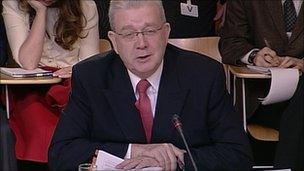Call for moratorium over rural school closures
- Published

Plans to close Scottish primary schools have been fiercely opposed
The Scottish government has called on councils to delay any plans to shut rural schools for a year.
Education Secretary Mike Russell said legislation on rural school closures was not working properly and had been "more difficult than we thought".
Mr Russell has set up a rural education commission to investigate the issue and asked local authorities to agree to a moratorium on closures until June 2012.
The Scottish government said it could force councils to comply, if necessary.
One local authority, Western Isles Council, announced plans to press ahead with legal action on the issue.
And another, Argyll and Bute, where Mr Russell is the local MSP, said the government must provide extra funding to halt any school closures under consideration.
Councils are responsible for delivering education, but Scottish ministers can "call in" plans for school closures if they say authorities have failed to properly consult local communities.
The commission will now look at the Schools Consultation Act, passed in the last parliament, and investigate a "clear legislative presumption" against rural school closures.
Mr Russell told BBC Radio Scotland he agreed with concerns from councils and education directors over the number of closure decisions being called in, and that the legislation was not working properly.
He also said the "Byzantine" funding arrangements for rural schools had to be looked at.
"The legislation, which was entered into with the best of intentions by all parties, has turned out to be more difficult than we thought," said the education secretary.
"I think it's right to pause, to step back, to have this moratorium and to set up this commission.
"Then I think we will be much clearer about how we could go forward together and positively, because this causes the most enormous amounts of angst and difficultly for ordinary people and for children."
Asked what action he would take if councils went ahead with closure plans, Mr Russell responded: "There is an established legal process, but I hope they won't do that, because, with goodwill and co-operation, we can get this right."
He said rural school closures "rarely" saved money, because of increased costs elsewhere as a result, such as transport.
Argyll and Bute Council is proposing to shut 11 primary schools - plans which have met with fierce local opposition.
The authority leader, Dick Wash, said the situation in his area, where there was primary school capacity for 11,500 pupils, but a roll of only 6,000, was "unsustainable".
He said of the moratorium: "If the Scottish government intends to prevent local authorities from considering their school estate, then it needs to provide additional funding to meet the resulting budget shortfall.
Balancing budgets
"Otherwise, this restriction will see less money for all schools as well as other services."
Mr Walsh added: "Argyll and Bute Council is currently facing unprecedented financial challenges which are impacting on every service area.
"At the same time, the diminishing economic activity in some of our rural communities is affecting the number of families living there, which has obvious implications for school rolls."
Elsewhere, Western Isles Council is seeking a judicial review of an earlier decision by the education secretary to halt the closure of four island schools.
The council had planned to close primaries at Carloway and Seilebost and secondaries at Shawbost and Lionel, on Lewis, but Mr Russell said the council's consultation was flawed.

Mike Russell is setting up a commission looking at rural education
Western Isles Council leader Angus Campbell said the government must pay to keep the schools open.
Council umbrella group Cosla suggested Mr Russell's move "did not add up" and said it was unhappy about not being consulted before Mr Russell wrote to councils individually.
Cosla president Pat Watters said: "Does anybody honestly think that any council leader or education convener takes a decision to close a single school, rural or otherwise, without a tremendous amount of thought?
"Yes, we are driven by factors like finance and balancing budgets, but our main motivation is councils need to support educational attainment for all our young people across their area."
He added: "If there is a way in which we can marry the financial issues facing us, the need to balance all the educational issues across a council area and a satisfactory outcome for pupils, parents, central and local government then that should be embraced and it would certainly be something that I would be willing to put to my colleagues in local government."
Mr Russell said the issue was directly matter between government and individual councils but welcomed Cosla's involvement in the issue.
Ministers will announce the details and remit of the commission shortly.
Labour and the Tories backed the government's request, while the Lib Dems called on the SNP to spell out the exact consequences for councils which went ahead with closures.
- Published1 June 2011
- Published20 April 2011
- Published12 January 2011
- Published12 January 2011
- Published5 January 2011
- Published25 November 2010